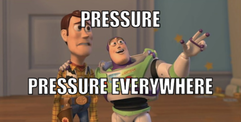
"Pressure, Pressure Everywhere"
By Stacey Gruber
“Pressure is nothing more than the shadow of great opportunity” – Michael Johnson
I was recently on a panel discussing sibling issues when a very concerned mom asked, “Did your parents ever put extra pressure on you to be perform or behave well because your sibling couldn’t, and how did that affect you?” There have been many academic articles (click here for more details) that highlight the fact that siblings to those with special needs often have are affected with perfectionism. Oftentimes this can be attributed to an expectation that their parents have for them to be the “perfect” child while their sibling is consuming much of the parental attention. But what I realized from that question was that my parents never pressured me to be perfect. I don’t remember them ever asking me to be exceptional at something that my brother (who has severe physical and motor deficits) couldn’t. But in a way, they didn’t have to. I put enough pressure on myself.
I’m reminded of this story which I used to find hilarious, but now find kind of troubling. I bombed a spelling test in third or fourth grade and was crying uncontrollably about it when I got home from school. My parents were a bit baffled about why this mattered so much to me.
Dad: Stace, it’s just a spelling test. One spelling test. You’ll try harder next time and everything will be fine.
Me: But how will I get into college?! (Mind you, I’m a fourth grader.)
Also me:
By Stacey Gruber
“Pressure is nothing more than the shadow of great opportunity” – Michael Johnson
I was recently on a panel discussing sibling issues when a very concerned mom asked, “Did your parents ever put extra pressure on you to be perform or behave well because your sibling couldn’t, and how did that affect you?” There have been many academic articles (click here for more details) that highlight the fact that siblings to those with special needs often have are affected with perfectionism. Oftentimes this can be attributed to an expectation that their parents have for them to be the “perfect” child while their sibling is consuming much of the parental attention. But what I realized from that question was that my parents never pressured me to be perfect. I don’t remember them ever asking me to be exceptional at something that my brother (who has severe physical and motor deficits) couldn’t. But in a way, they didn’t have to. I put enough pressure on myself.
I’m reminded of this story which I used to find hilarious, but now find kind of troubling. I bombed a spelling test in third or fourth grade and was crying uncontrollably about it when I got home from school. My parents were a bit baffled about why this mattered so much to me.
Dad: Stace, it’s just a spelling test. One spelling test. You’ll try harder next time and everything will be fine.
Me: But how will I get into college?! (Mind you, I’m a fourth grader.)
Also me:

(Persistent that things would not be fine.)
Dad: Grades don’t matter until high school anyway. When you apply to college no one looks at your grades before high school.
That worked to calm me down. Whew. So for the rest of my middle school and junior high years I was a “do juuuuuust enough work to squeak by to the next grade and screw the rest” type of student. My parents actually tried their best to relieve any sort of obligation that I was feeling to excel.
Then high school came, and I was once again stressed about getting the perfect grades so I could get into college. But this time I could handle it a little better. Luckily as it turns out I’m pretty good at all things academic. Seriously, I have spoken with my hometown friends about the fact that in middle school I was one of the poorer performing kids in my grade, so everyone was surprised when I graduated first in my class in high school. Because of those middle/junior high years, I was also good at doing the minimal amount of effort to still get an A. (I was such a perfectionist that I had even optimized the easiest way to get an A. Perfectionism has no bounds.) But that doesn’t mean there wasn’t pressure. This time it revolved around more than just school – sports, volunteer groups, student council, my social life, and more all swirled around, fighting for the top spot. All the time I was standing on a fragile set of stilts ready to crumble. I was balancing the (self-induced) pressure to be extraordinary at everything and justifying it with a quote by Michael Johnson I learned of when I was running track: “Pressure is just the shadow of great opportunity.” (← don’t get me wrong, it’s a good quote, but not when it’s used to distort perceptions of healthy amounts of stress). The stress piled up, the stilts began to crumble, and just as quickly as I had gotten “over” perfectionism after my fourth grade spelling test I was right back in the thick of it. Perfectionism never really goes away in my experience, so here I am today still mulling over the piece you’re reading right now.
I can’t help but think, “that pressure, though self-inflicted, had to have originated somewhere.” It may have come from two places. The first is subconsciously. Anyone, even if they have limited emotional capacity, could imagine the stress parents with special needs go through. Studies have also shown that siblings of people with disabilities have a significant amount of empathy for those who are different or having a hard time, even at a young age. Maybe I could subconsciously relate to my parents’ situation, could envision what they would want from their other kids, and made it my responsibility to do and be those things. Secondly, as Alicia Arenas mentions in her TED talk “Recognizing Glass Children,” other adults can project their expectations on siblings by saying things like “make sure you’re a good girl for mommy and daddy” or “you better be a big helper.” After nearly every adult (whom children view as an authoritative figure) tells you these types of things throughout the developmental years of a your life, don’t you think it would be hard not to listen? In truth it’s hard to say, and it doesn’t really matter for me. But maybe you could just think about it next time you speak with a young sibling of someone with disabilities.
And so goes only *part* of my story of perfectionism. I know I’m only one of thousands (hundreds of thousands? millions?) of siblings who can relate to this feeling. I hope my story will help the world feel a little more connected.
From one recovering perfectionist to another,
Stacey
Dad: Grades don’t matter until high school anyway. When you apply to college no one looks at your grades before high school.
That worked to calm me down. Whew. So for the rest of my middle school and junior high years I was a “do juuuuuust enough work to squeak by to the next grade and screw the rest” type of student. My parents actually tried their best to relieve any sort of obligation that I was feeling to excel.
Then high school came, and I was once again stressed about getting the perfect grades so I could get into college. But this time I could handle it a little better. Luckily as it turns out I’m pretty good at all things academic. Seriously, I have spoken with my hometown friends about the fact that in middle school I was one of the poorer performing kids in my grade, so everyone was surprised when I graduated first in my class in high school. Because of those middle/junior high years, I was also good at doing the minimal amount of effort to still get an A. (I was such a perfectionist that I had even optimized the easiest way to get an A. Perfectionism has no bounds.) But that doesn’t mean there wasn’t pressure. This time it revolved around more than just school – sports, volunteer groups, student council, my social life, and more all swirled around, fighting for the top spot. All the time I was standing on a fragile set of stilts ready to crumble. I was balancing the (self-induced) pressure to be extraordinary at everything and justifying it with a quote by Michael Johnson I learned of when I was running track: “Pressure is just the shadow of great opportunity.” (← don’t get me wrong, it’s a good quote, but not when it’s used to distort perceptions of healthy amounts of stress). The stress piled up, the stilts began to crumble, and just as quickly as I had gotten “over” perfectionism after my fourth grade spelling test I was right back in the thick of it. Perfectionism never really goes away in my experience, so here I am today still mulling over the piece you’re reading right now.
I can’t help but think, “that pressure, though self-inflicted, had to have originated somewhere.” It may have come from two places. The first is subconsciously. Anyone, even if they have limited emotional capacity, could imagine the stress parents with special needs go through. Studies have also shown that siblings of people with disabilities have a significant amount of empathy for those who are different or having a hard time, even at a young age. Maybe I could subconsciously relate to my parents’ situation, could envision what they would want from their other kids, and made it my responsibility to do and be those things. Secondly, as Alicia Arenas mentions in her TED talk “Recognizing Glass Children,” other adults can project their expectations on siblings by saying things like “make sure you’re a good girl for mommy and daddy” or “you better be a big helper.” After nearly every adult (whom children view as an authoritative figure) tells you these types of things throughout the developmental years of a your life, don’t you think it would be hard not to listen? In truth it’s hard to say, and it doesn’t really matter for me. But maybe you could just think about it next time you speak with a young sibling of someone with disabilities.
And so goes only *part* of my story of perfectionism. I know I’m only one of thousands (hundreds of thousands? millions?) of siblings who can relate to this feeling. I hope my story will help the world feel a little more connected.
From one recovering perfectionist to another,
Stacey
Siblings with a Mission is a non-profit, international organization established to serve and support siblings of individuals with complex health conditions and developmental disabilities. All images are found on Google images and are solely used for educational purposes. The stories and advice provided by Siblings with a Mission are not to be replaced by professional advice and counseling but to be considered as an additional source of support.

